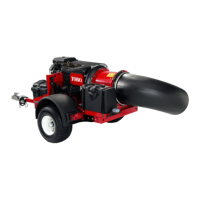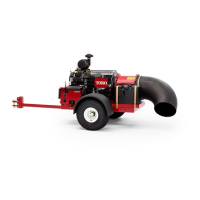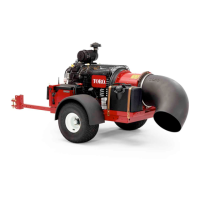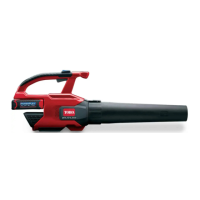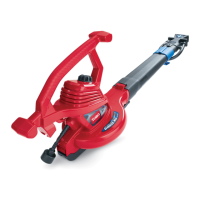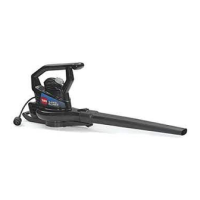Do you have a question about the Toro 44538 and is the answer not in the manual?
Covers California warnings, engine muffler requirements, FCC compliance, and safety alert symbol identification.
Information on contacting Toro for product details, support, and registering your product online.
Instructions for safe operation, including training, preparation, and fuel handling precautions.
Steps for preparing the work area and the machine before operation, including inspection and safety checks.
Key steps for maintenance including cooling the engine, disconnecting power, and cleaning the machine.
Guidance on engine speed, oil checks, battery charging, and using Toro-approved attachments.
Details and explanations of various safety and instructional decals found on the machine.
Chart to verify shipped loose parts and list of media like manuals and parts catalog.
Procedure for removing, activating, and charging the battery, including safety for electrolyte.
Warnings about short circuits, proper cable connection, and charging hazards during battery installation.
Procedure for mounting the hitch to the debris blower assembly using provided hardware.
Steps to connect the blower's hitch to the tow vehicle, adjusting clevis and hitch tube.
Description and function of various controls including Engine Stop, Start, Nozzle Direction, Engine Speed, and Ignition Switch.
Steps for starting the engine using the ignition switch and remote control.
How to use the choke control lever to start a cold engine.
Explanation of the hour meter's function to track total machine operating hours.
Instructions for safely adding unleaded regular gasoline, including fuel type, capacity, and precautions.
Detailed warnings about gasoline flammability, static electricity, and safe fueling practices.
Benefits and usage of fuel stabilizer/conditioner for gasoline freshness and system cleaning.
Procedure for checking fuel level using the cap gauge and filling the tank to the correct level.
Procedure for checking engine oil level, including best times and preventing overfilling.
Information on checking tire pressure and the correct specification (14 psi).
Procedure for starting the engine, including attachment to tow vehicle and choke usage.
Steps to safely stop the engine, including reducing speed, idling, and using the stop button.
Details on the controller's time-out feature and how to reset or avoid it.
How to change the direction of the nozzle opening using the remote control.
Tips for safe operation, including awareness of discharged air force, bystanders, and slope operation.
Schedule outlining maintenance tasks based on operating hours or intervals.
Checklist for daily or routine maintenance items to ensure proper operation.
Steps for removing air cleaner cover, knob, and filters for servicing.
Procedure for washing and oiling the foam pre-filter element.
Steps for correctly installing the foam and paper air filter elements and assembly.
Procedure for checking engine oil level, including best times and preventing overfilling.
Steps for draining and refilling engine oil, including warming the engine and proper disposal.
Procedure for removing the old oil filter, installing a new one, and checking for leaks.
Steps to re-synchronize the remote transmitter with the control module if it has been replaced.
Procedure for checking, removing, and installing spark plugs, including air gap adjustment.
Procedure for replacing the fuel filter, including loosening hose clamps and removing the old filter.
Instructions for cleaning engine screen and oil cooler to remove debris.
Procedure for safely draining the fuel tank, including precautions for gasoline.
How to check and ensure the nozzle clamp is tight for secure nozzle attachment.
Procedure for adjusting belt tension if the belt slips during nozzle direction changes.
Information about the 15 amp in-line fuse and the grey fusible link in the wiring.
Guidelines for disposing of engine oil, batteries, and other pollutants according to regulations.
Steps to prepare the machine for non-use over 30 days, including fuel stabilization and cleaning.
Instructions for adding fuel stabilizer, running the engine, and draining the fuel tank for storage.
Diagram illustrating the electrical connections and components of the machine.
Details on what is covered under the two-year limited warranty for Toro commercial products.
Owner's responsibilities, items not covered, and conditions that can void the warranty.
Warranty coverage for replacement parts and services considered owner's expense.
Warranty terms, limitations, liability, and legal rights, including engine warranty notes.
